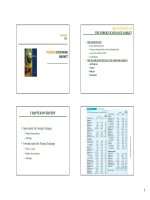Lecture Multinational financial management: Lecture 1 - Dr. Umara Noreen
Bạn đang xem bản rút gọn của tài liệu. Xem và tải ngay bản đầy đủ của tài liệu tại đây (275.15 KB, 15 trang )
Lecture
1Multinational Financial
Management:
An Overview
Chapter Objectives
To identify the main goal of the
multinational corporation (MNC) and
potential conflicts with that goal;
To describe the key theories that justify
international business; and
To explain the common methods used to
conduct international business.
Goal of the MNC
• The commonly accepted goal of an MNC
is to maximize shareholder wealth.
• We will focus on MNCs that wholly own
their foreign subsidiaries.
Financial managers throughout the MNC
have a single goal of maximizing the value
of the entire MNC.
Conflicts with the MNC Goal
• When a corporation’s shareholders differ
from its managers, a conflict of goals can
exist—the agency problem.
• Agency costs are normally larger for
MNCs than for purely domestic firms, due
to:
– the difficulty in monitoring distant managers,
– the different cultures of foreign managers,
– the sheer size of the larger MNCs, and
– the tendency to downplay short-term effects.
Conflicts with the MNC Goal
• Subsidiary managers may be tempted to
make decisions that maximize the values
of their respective subsidiaries.
Impact of Management Control
• The magnitude of agency costs can vary
with the management style of the MNC.
• A centralized management style reduces
agency costs. However, a decentralized
style gives more control to those
managers who are closer to the
subsidiary’s operations and environment.
Centralized Multinational Financial Management
for an MNC with two subsidiaries, A and B
Cash
Management
at A
Inventory and
Accounts
Receivable
Management at A
Financing at A
Capital Expenditures
at A
Financial
Managers
of Parent
Cash
Management
at B
Inventory and
Accounts
Receivable
Management at B
Financing at B
Capital Expenditures
at B
Decentralized Multinational Financial Management
for an MNC with two subsidiaries, A and B
Cash
Management
at A
Financial
Managers
of A
Inventory and
Accounts
Receivable
Management at A
Financing at A
Capital Expenditures
at A
Financial
Managers
of B
Cash
Management
at B
Inventory and
Accounts
Receivable
Management at B
Financing at B
Capital Expenditures
at B
Impact of Management Control
• Some MNCs attempt to strike a balance
– they allow subsidiary managers to
make the key decisions for their
respective operations, but the parent’s
management monitors the decisions.
• Today, electronic networks make it
easier for the parent to monitor the
actions and performance of its foreign
subsidiaries.
Impact of Corporate Control
• Various forms of corporate control can
reduce agency costs:
– stock options
– hostile takeover threat
– investor monitoring
Constraints Interfering with the
MNC’s Goal
• MNC managers are confronted with
various constraints:
– environmental constraints
– regulatory constraints
– ethical constraints
A recent study found that investors
assigned a higher value to firms that
exhibit high corporate governance
standards and are likely to obey ethical
constraints.
Theories of International
Business
Why are firms motivated to expand
their business internationally?
Theory of Comparative Advantage
– Specialization by countries can increase
production efficiency.
Imperfect Markets Theory
– The markets for the various resources
used in production are “imperfect.”
Theories of International
Business
Why are firms motivated to expand
their business internationally?
Product Cycle Theory
– As a firm matures, it may recognize
additional opportunities outside its home
country.
The International Product Life Cycle
Firm creates
product to
accommodate
local demand
a. Firm
differentiates
product from
competitors
and/or expands
product line in
foreign country
Firm exports
product to
accommodate
foreign demand
or
b. Firm’s
foreign
business
declines as its
competitive
advantages are
eliminated
Firm
establishes
foreign
subsidiary
to establish
presence in
foreign
country
and
possibly to
reduce
costs
References
• Adopted from South-Western/Thomson
Learning © 2006









